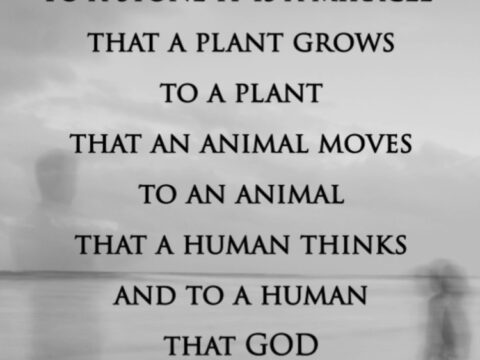
Man’s highest good is God, and God alone. Taken in a broad sense, we may say that God is the highest good for all creatures. For God is the Creator and Sustainer of all things, the origin of all being and life, the abundant fountain of all good. All creatures owe their existence from moment to moment solely to Him, who is the one, eternal and omnipresent Being.
But the concept of the highest good usually includes the idea that it is also known and enjoyed as such by the creatures. And this, of course, is not the case with the inanimate and the non-rational creatures.The inanimate ones have only an existence, and have no principle of life at all. Other creatures, such as the plants, have a principle of life in them, but are devoid of any awareness. The animals, it is true, have received in addition to their existence and their life a kind of awareness, but it is an awareness which can take note only of the visible and sensible things around them. They then know about earthly things, but not about heavenly ones; they know about the real, the pleasant and the useful, but they have no awareness of the true, the good and the beautiful; they have a sensual consciousness and a sensual desire, but do not penetrate to the spiritual.
It is quite different with mankind. In the beginning he is created in God’s image and likeness and can never erase or destroy his divine origin and his divine kinship. Even if he has lost the glorious qualities of knowledge, righteousness and holiness, which are inherent in the image of God, through sin, there are still “little remnants” of the gifts bestowed on him, which are not only sufficient to rob him of all innocence, but which also bear witness to his former greatness and are a constant reminder of his divine calling and heavenly destiny.
In all the thinking and working, in the whole life and striving of mankind, it becomes apparent that he is not satisfied with what the whole corporeal world has to offer. He is a citizen of a sensual order of things, but from this order he also raises himself to a supernatural order. With his feet planted on the earth, he raises his head and looks up to heaven. He has knowledge of things that are visible and temporary, but also has awareness of things that are unseen and eternal. His desire is for earthly, sensual, perishable goods, but also for heavenly, spiritual, imperishable goods.
Man has in common with the animals sensory perception and consciousness. But above that he has been equipped with a mind and a reason, which enable him to think and to rise from the world of sensory perceptions to the world of immaterial concepts and to the realm of imperishable ideas. Man’s thinking and knowing, although bound to the brain, is itself in its essence entirely a spiritual activity, rising above the things he sees with his eye and feels with his hand. Through this thinking he places himself in relation to a world which he cannot see or touch, but which nevertheless exists as well as and possesses more true reality than earthly physicality. What he seeks is not tangible reality, but spiritual truth, a truth that is one, eternal and imperishable. His mind finds rest only in such an absolute divine truth.
In the same way, mankind shares with animals the sensual desire. He therefore needs food and drink, light and air, work and rest, and is dependent on the whole earth for his physical existence. But above this desire he has received a will which, guided by reason and conscience, reaches out to other and higher goods. Pleasant and useful things, although of value in their place and time, do not satisfy him; he seeks a good that is not good because of circumstances, but that is good in and through and for itself, an unchanging, spiritual, eternal good. And his will, can find rest only in such supreme, absolute divine goodness.
Both, mind and will, are rooted in the heart of man, according to the interpretation of the Holy Scriptures. The Proverbs says of the heart that it must be preserved before all things, because out of it are the issues of life, 4:23. Just as the heart is, in a natural sense, the starting point and driving force of the blood circulation and therefore the main organ of physical life, so it is also, spiritually and morally, the source of the higher life in man, the seat of our self-awareness, of our relationship to God, of the bondage to His law, of our entire spiritual and moral nature. And thus our whole rational and willing life derives its origin from that and is determined by it in its direction.
We learn from Ecclesiastes 3:11 that God has put a sense of eternity in heart of man. God creates everything at its time, He allows everything to take place at the right time, determined by Him, so that history as a whole and in all its parts corresponds to God’s counsel and brings to light the glory of His counsel. God has placed man in this world and has placed that eternal sense in his heart, so that he may not remain absorbed in external, visible manifestations, but should instead seek out and come to know God’s eternal thoughts in the temporal course of nature and history.
This “desiderium aeternitatis“, this longing for eternity, which God has planted in man’s heart, in the innermost part of his being, in the core of his personality, is the cause of the undeniable fact that he is not satisfied by anything temporary. He is a sensual, earthly, limited, mortal being and yet he is prepared for eternity and destined for it. It is of no use to man whether he gains wife and children, houses and fields, treasures and goods, yes the whole world, if his soul should suffer loss (Matt 16:26). For the whole world cannot balance the scale against the worth of a man. There is no one so rich that he can by any means redeem the soul of his brother, nor give to God a ransom for him; the ransom of the soul is too much for any creature to bear (Ps. 49:8, 9).
Now there are many who will agree with all this, as long as there is talk of sensual pleasures and earthly treasures. They fully acknowledge that these things are not able to satisfy mankind and are not in accordance with his high destiny.
But they judge differently, if the so-called ideal values—science, art, culture, the service of the true, the good, and the beautiful, the living for others, and the aspiration to serve what is called humanity—are considered. But all these things also belong to the world, of which Scripture testifies that it passes away with all its desires (John 2: 17).
Science is most certainly a good gift, coming down from the Father of lights, and as such is to be highly esteemed.
When Paul calls the wisdom of the world foolishness with God (1 Cor. 3:19), and elsewhere warns against philosophy (Col. 3:8),he has in mind that false and vainly imagined wisdom which has not acknowledged the wisdom of God in His general and special revelation (1 Cor. 1: 21) and has become vain in all its imaginations (Rom. 1:21). But for the rest, through Paul and throughout the Scriptures, knowledge and wisdom are held in very high esteem. For the whole Bible affirms that God alone is wise, that He has perfect knowledge of Himself and of all things, that by wisdom He established the world, that He makes its manifold riches known to the church, that in Christ are hid all the treasures of wisdom and knowledge, and that the Spirit is the Spirit of wisdom and knowledge searching out the deep things of God (Prov. 3:19; Rom. 11:33; 1 Cor. 2:10; Eph. 3:10; and Col. 2:3). A book, which proceeds from such thoughts, cannot slight knowledge nor despise science. On the contrary, wisdom is better than rubies, and all that one can desire cannot be compared with it (Prov 8:11); it is a gift from Him who is the God of science (Prov 2: 6, 1 Sam 2: 3).
But the Scriptures demand such a science, which has the fear of the Lord as its principle (Prov 1:7). If it is separated from that, it may still bear the false name of science, but it gradually degenerates into a worldly wisdom, which is foolishness in the sight of God. Any science, philosophy, or knowledge which supposes that it can stand on its own pretensions, and can leave God out of its assumptions, becomes its own opposite and disappoints everyone who builds up their expectations on it.
And this is also easy to understand. For in the first place, science always has a special character about it and can be the portion of only the few; those select few, who can devote their whole lives to its pursuit, only conquer a small part of its field and remain strangers to the rest; and whatever satisfaction knowledge may give, it can never, because of this very special and limited character, satisfy the deep needs which are innate to human nature and therefore present in every human being.
In the second place, whenever science and philosophy revives after a period of decline, it begins with an extraordinary, exaggerated expectation; it lives in the hope that through continued research it will solve the riddles of the world and life. But just as surely disappointment sets in after the youthful exuberance; with the continuation of the research the problems do not diminish but increase; what seemed self-evident turns out to be a new mystery, and the end of all science is again the sad and despairing confession that man walks the earth in riddles, and that life and fate are both mysteries.
Thirdly, one may still consider, that science or philosophy, even if it could come to know much more with certainty than it actually achieves, would still always leave mankind’s heart unsatisfied. For knowledge without virtue, without a moral basis, becomes an instrument in the hand of sin for the contemplation and execution of finer evils, and the head filled with science enters into the service of a depraved heart. Therefore, says the Apostle, though I have the gift of prophecy, and understand all mysteries, and all knowledge, and have not love, I am nothing (1 Cor. 13:2).
It is no different with art. This too is a gift of God. Just as the Lord Himself is not only truth and holiness but also glory, and extends the glory of His name over all His works, so it is also He who, through His Spirit, equips artists with wisdom and understanding and knowledge in all their works (Ex. 31: 3, 35: 31). So art is first and foremost proof of man’s ability, his spiritual ability, a revelation of his deep desires, his lofty ideals, his burning thirst for harmony. But moreover, in all her works she presents us with an ideal world, in which the discord of this earthly existence is resolved into a full chord and a beauty comes to light, which in this fallen world was hidden from the wise, but which the simple eye of the artist has discovered. And because art paints such a different, higher reality before our eyes, it is a comfort to us in life, it lifts our souls from their torpor and fills our hearts with hope and joy.
But whatever it may do, it only makes us enjoy its beauty in pictures; it cannot close the gap between the ideal and reality, it never makes the “over there” into a “here“, it shows us the glory of the land of Canaan from afar, but it does not bring us in and make us citizens of it. She is many things, but she is not everything; she is not, although a man of renown in her field called her that, she is not the most holy, not the most noble, not the only religion and the only salvation of mankind. It does not atone for our guilt, it does not cleanse us from our wickedness, it is not even capable of drying our tears in the sorrows of life.
Finally, culture, civilization, humanitarianism, the life of society, or whatever one may call it, cannot be considered the highest good for mankind. There is no doubt that we can speak of a progression of humanitarian ideas, of a development of philanthropy. If we compare how the poor and the sick, the miserable and the needy, the widows and orphans, the insane and the prisoners were treated many times in former centuries and how they are generally treated and cared for today, then there is reason to rejoice and be grateful. A spirit of compassion and mercy has been awakened that seeks the lost and takes care of the oppressed. But this same present time shows us so many dreadful iniquities of womanism, prostitution, alcoholism, and other abominations that we are shy of an answer to the question of whether we are moving forwards or backwards, and at one moment inclined to optimism, but the next plunged into deep pessimism.
Be that as it may, this much is sure, if life for the community, if love for one’s neighbor, is not rooted in the law of God, it will lose its force and character. Love for one’s neighbor is not something that comes naturally and spontaneously from the human heart. It is a feeling, an act, an activity, which requires immense willpower and must be constantly maintained against the tremendous powers of selfishness and self-interest. Moreover, it often finds no support at all in the person next door. People are not usually so lovable that we can and want to love them as ourselves without any effort or struggle. Love for one’s neighbor can only be sustained if, on the one hand, it is founded in and imposed on us by the law of God, and if, on the other hand, that same God gives us the desire in our hearts to walk in sincerity according to all His commandments.
Thus it remains true to the word of Augustine that the heart of man was created for God and that it finds no rest until it is at rest in his Father’s heart. Hence all men are really seeking after God, as Augustine also declared, but they do not all seek Him in the right way, nor at the right place. They seek Him below, and He is above. They seek Him on earth, and He is in heaven. They seek Him afar, and He is near. They seek him in money, in goods, in glory, in power, in lust: and he dwells on high, and in the holy place, and with him that is of a contrite and humble spirit (Isa. 57:15). But still they seek Him, if they may seek Him and find Him (Acts 17:27). They seek Him and at the same time they flee from Him. They have no desire to know His ways, and yet they cannot do without Him. They feel attracted to God and at the same time repelled by Him.
Herein lies, as Pascal so profoundly developed, the greatness and at the same time the misery of mankind. He thirsts for truth and is a liar by nature. He thirsts for peace and throws himself from one scattering into another. He hungers for lasting, eternal happiness, and seizes the pleasures of the moment. He seeks God, and he loses himself in the creature. He is a born son of the house, and feeds on boar’s troth in a strange land. He forsakes the fountain of living waters and hews out broken cisterns that can hold no water ( Jer. 2:13). He is like a hungry man who dreams that he eats, but when he wakes up his soul is empty; or like a thirsty man who dreams that he drinks, but when he wakes up, behold, he is still stale and his soul is hungry (Isa. 29:8).
Science cannot explain this contradiction in man. It only reckons with his greatness and not with his misery, or only with his misery and not with his greatness. It exalts him too high, or it depresses him too low, because it does not know of his divine origin, nor of his deep fall. But Scripture knows both, it sheds light on man and mankind; and the contradictions are reconciled, the mists are cleared up, and the hidden things are revealed. Man is a riddle, whose solution can be found only in God.
Herman BAVINCK. Amsterdam, May 1907. MAGNALIA DEI.



